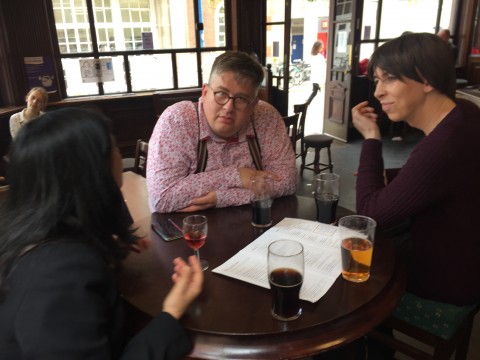In London at an LGBT conference

It seems strange to be writing this on the morning after a terrorist attack in London. I was there in the city at the beginning of the week, attending a conference on LGBT networks in Higher Education, and now this.
London struck me as a beautiful place when I was there. I grew up in the 1980s and 90s and imagined the English capital as a place of pollution and litter. Perhaps it was, back then; I remember the ‘Keep Britain Tidy’ campaigns of my childhood in cinemas and on the back of crisp packets, as they tried to do away with the culture of casual littering. But walking through London this past week, I understood why people flock to it. That windswept, asphalt smell that hits you on the Underground of a million stations, then in daylight, the sense of something prestigious, at least in the Temple district, of people who inhabit another world, a private school world, glamorous and utterly beyond me, a Wimbledon world of privilege. Then through the high streets, striding behind the guy I was with from Edinburgh, a small suitcase in tow, feeling vaguely important in my business suit and heels as a six-foot transwoman PA, passing men and women in their business suits.
The photo shows me in profile and in discussion after the conference had finished, and some of us had gathered in a London pub to network. You can see me talking with Isabella, while staring morosely into the lens is Andy. Isabella said some really nice things to me about how I looked. When I got back to Edinburgh with the guy I was with, Jonathan, he asked me for my reflections on the conference. ‘The woman, Isabella, said nice things to me, and London was nice,’ was my reply. He must have been wondering why our LGBT network had bothered to pay for me to come along, but actually there was something I remember from one of the speakers, and it’s this:
People perform better when they can be themselves.
Yes, I think so too. I was a terrible student in my younger days, and it’s costing me now. Now, I am the kind of student who can get distinctions, but ‘way back when’, before I was out as transgender, I applied myself to all things like a zombie. I simply switched off and escaped, into Ealing comedies on a bedroom TV or in unreal fantasies of myself in an imagined America.
So now, when I apply for funding, I can’t get it, because people see my record from the past and immediately dismiss my application, regardless of the impact I talk about making, or the performance I’m now capable of scoring. I wish there was a greater understanding with funding bodies and with the HR departments of Edinburgh University, who think it’s a level playing field, but I’m not sure it is, not if you were once someone who couldn’t engage with the world, and was accordingly a mediocrity.
I wonder how I can contribute in changing that for future generations, but in the meantime, the London conference was useful to me in consolidating this sense of unevenness I have, concerning the opportunities out there, for trans people but also for anyone else weighted down by a past that once zombified them from any discernible achievement.
To conclude: I went down to London and enjoyed its magic, and picked up breadcrumbs of useful ideas, which may not be breadcrumbs but seeds. And London was a shining, happy place to be, and I wonder why those terrorists did what they did, what was this cause they decided to kill for, and die for, with their foot-long knives and fake suicide belts.
Article by Gina Maya
Taken from her blog: https://www.ginamaya.co.uk/transgender-life/in-london-at-an-lgbt-conference.html
(https://www.ginamaya.co.uk/transgender-life/in-london-at-an-lgbt-conference.html)
(https://www.ginamaya.co.uk/transgender-life/in-london-at-an-lgbt-conference.html)





